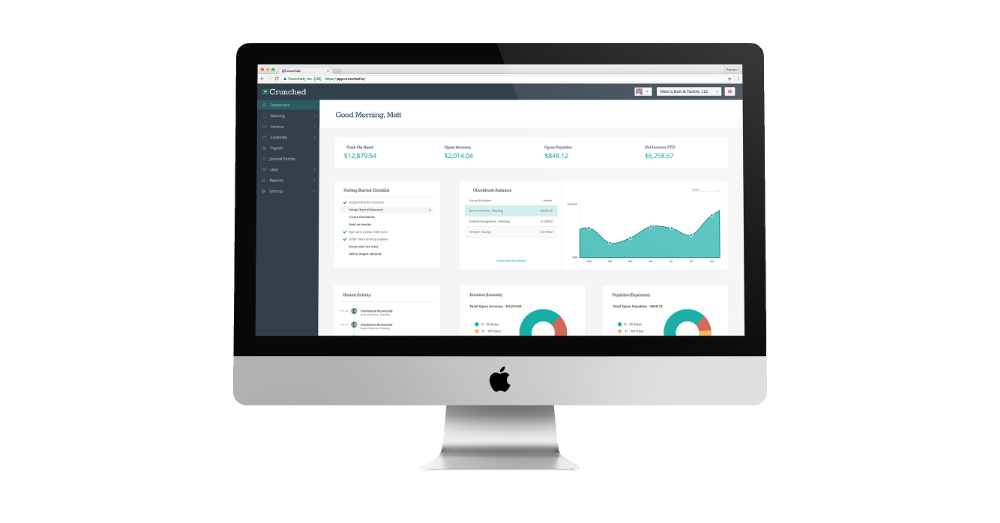Small Business Financial Management Essentials
By Matt Reims
Whether you’re setting up a new business or looking to establish more formal operations, one of the most important considerations will be your finances and bookkeeping. As a small business owner, you’re probably juggling multiple tasks. For most entrepreneurs, the idea of financial management may not be the most exciting of endeavors, but the truth is that basic small business bookkeeping does not have to be difficult. With the right tools, like good cloud accounting software, and information, like the tips below, you can ensure that everything runs smoothly.
Although bookkeeping can be one of the less glamorous parts of running a business, it’s one of the most important. Attentive accounting can help you avoid tax penalties, track your expenses and cash flow, and monitor your company’s growth and profitability. The first step toward taking control of your bookkeeping is to find the right tool to help you manage your books.
Financial Management Platform; Cloud Accounting Software
Although some small businesses still manage their books manually, more and more are discovering the effectiveness of accounting software to help automate the process and make it significantly easier to manage. Cloud accounting software takes things a step further by providing you with full access to your finances from any internet-connected device.
The right platform should be ultra-secure. Look for bank-grade security measures, redundant backups, SSL certificate use, and dual authentication for login and account retrieval. And because cloud accounting software is automatically updated, it will save you time and money. You’ll be able to track your financial positions in real time; no matter where you are, you can stay on top of your business’s overall financial well-being. Also, look for ease-of-use features that include simple, clearly labeled navigation and workflow, clear terminology and instructions, and in-system notifications to help you avoid mistakes.
Financial Reporting
The best way for small business owners or bookkeepers to keep their finances in order is to maintain a frequent and consistent plan for managing them. This can be done with financial reports. Financial reports provide a high-level view of your business’s financial health at all times, and the right cloud-based accounting software will help you produce these reports. For those who are starting a new business, having a structured financial reporting system in place helps provide peace of mind and can help keep the business in the black.
There are three key financial reports you want to keep track of: income (revenue and expenses over a period of time), cash flow (exchange of money between your business and the outside world over a period of time), and your balance sheet (covers your business’s assets and liabilities during a specific point in time).
When you have these reports on hand, you can access data and numbers that will assist you with how you make investing, credit, and resource allocation decisions.
To summarize, your income statement will help you see where your money goes, the cash flow report lets you know how your cash is moving in and out of your company, and your balance sheet will provide a diagnosis of your finances.
Cash Management Systems/Tools
Let’s dive a little deeper into cash flow; after all, this is the lifeblood of your small business. The inability to pay an obligation because of a lack of cash means your business is insolvent. You can avoid this by monitoring your cash flow, and accounting software will make this process simple. This is crucial for maintaining a safety net for unexpected expenses, expanding your business, getting a line of credit, and hiring and maintaining employees.
Waiting for payments to come in is one of the biggest cash flow holdups for any small business. Reasons for delay can range from waiting for a check to arrive in the mail, for the payment to process, or for the bank to make the funds available. One way you can combat delays is by working with a third-party vendor who can receive, process, and deposit your payment for you. The effectiveness of a third-party vendor will depend on numerous factors, however, including how the firm collects payments, how much it costs to process payments, and more. In most cases, handling collections and payments in-house, with the help of your cloud-based accounting software solution, is more efficient and less costly than hiring a vendor. The key to making sure cash flow is solid from customers is to set up consistent billing and collection practices from the beginning of the relationship.
To manage your company’s cash more effectively, take time to come up with realistic projections, use your accounting software tools to help you keep track of both collections and disbursements of cash, set up an effective billing and collection system within the software platform, and stick to all and any restrictions in your budget.
When setting up a business, it doesn’t take long to realize you’ll be pulled in a number of different directions, and not all of them are finance-focused. You don’t want to ignore your financial details. With the right tools in place, like a solid cloud accounting software platform, and a basic knowledge of financial essentials, your small business is well on its way to staying financially fit on a consistent basis.


